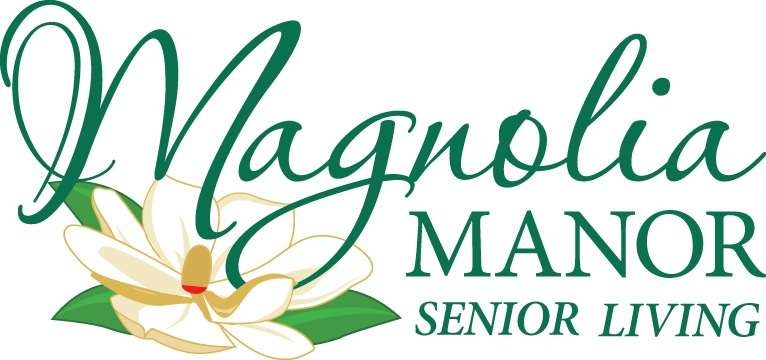Faith-Based Senior Living in Georgia
Don't have time to read this now? Download a pdf version instead.
Faith-Based Senior Living in Georgia
It’s not easy getting older. Most seniors often face increasing health concerns. Naturally you start to wonder, and perhaps worry, what will happen to you if there comes a point when you cannot handle all of life’s challenges on your own. Will you have to relocate away from family, friends, your church community, not to mention your long-time home?
There are many factors to consider regarding senior living communities, but the overall atmosphere is crucial in determining a comfortable, long-term fit. For those with a strong faith, an atmosphere that encourages and supports spiritual growth can be a real blessing.
Seniors often choose Magnolia Manor because they know they can profess their faith openly. They assume, correctly, that we will lean into our faith as we journey together through life. However, our communities welcome residents of all faiths, and every one of our residents has the opportunity to practice their beliefs in their own way.
There are good reasons to choose a senior living community. There is a strong sense of community, which encourages and supports interaction among residents. One of the greatest risks to seniors is isolation, whereas social activities help prevent feelings of loneliness and depression. Social activities can even help reduce the risk of cardiovascular problems and slow progression of Alzheimer’s disease. Social connections are important for all of us, but they become even more important as we age; helping us cope with challenges such as illness, loss of a spouse or friends, and our own mortality.
-1.jpg?width=5472&name=Macon%20Photos%20(1869)-1.jpg)
Does faith matter when you’re considering a move to a senior living community?
It certainly can. According to the Elder Care Alliance, “A spiritual connection can boost seniors’ wellness, especially when their senior living community supports faith practices.” Faith groups offer a compelling sense of community, where individuals can worship together or simply pray with a friend.
Some senior communities report that incoming residents who do not practice any particular faith or who claim to be non-spiritual find themselves thriving as they are drawn into the community’s welcoming and accepting environment.
That said, more than 90% of older Americans consider themselves to be religious or spiritual, with about half of them attending religious services at least weekly, often more frequently. Other than family, their faith community is their greatest source of social support. Religious beliefs can provide tremendous comfort and support – a framework to cope with change and new challenges and a group of fellow church members who are devoted to helping one another with fellowship, personal assistance, and prayer.
If this sounds like you, a faith-based community may offer an even stronger sense of connection and comfort than a secular community.
What if You Don't Want to Move?
According to AARP, nearly 90% of seniors would prefer to get help at home rather than move to a new setting. That’s certainly a possibility, at least for now. In response to high interest in aging in place, the at-home care industry has burgeoned. You can now receive help with household and personal tasks, assistance with activities of daily living, and even advanced medical care at home. This can be a valuable option for seniors who are just starting to need certain kinds of help or who just don’t want to do certain chores any more.
Nonetheless, a senior living community may be the better option even if you’re still fully independent. But the thought of uprooting oneself and moving to a retirement community or assisted living is daunting for many seniors who are reluctant to leave life as they know it behind. This can be especially troublesome if you’re closely connected to your church, your pastor, and your fellow congregants.
Learning more about senior living will help you feel more comfortable and confident in deciding whether – or when – you should make the move.
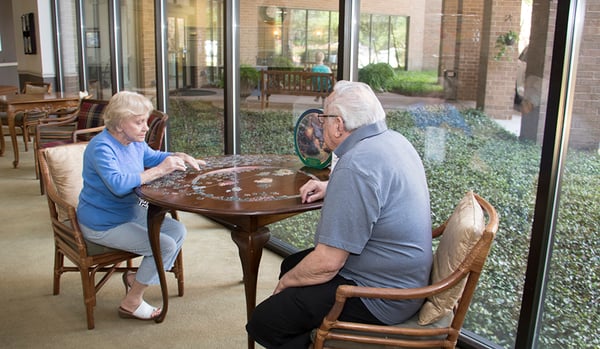
Get the Facts!
Perhaps you’re hesitant to consider senior living because you have the wrong impression. Myths and misconceptions linger, even though they are far from accurate. So let’s set the record straight!
- You do not lose your independence.That’s the whole point. Whether you are still fully able to do for yourself or you need some help due to declining physical or mental capabilities, you can maintain your independence. The goal is always to help each resident maintain maximum independence as their personal situation allows.
- You do not have to abandon your past.Your senior living villa or apartment will probably be smaller than where you live now, but there’s a lot to be said for living with less clutter. Paring down and simplifying your life enables you to focus on the positives of retirement – the carefree life. You will still be surrounded by the essentials – your most treasured furniture and other belongings. Your family and friends will still be able to visit, plus you can add an entire new group of friends and neighbors to the mix.
- You won’t have room for your favorite hobbies.Senior living communities are filled with hobbyists of every sort. Why should you give up gardening, or crafting, or music just because you move? A great community provides space for like-minded residents to do their thing, whether it’s planting veggies, quilting, working on huge puzzles, playing the piano, etc.
Several of our Magnolia Manor communities include resident-musicians. They perform individually or as a band to entertain their neighbors, or to please themselves. And when they play, others get to sing -- old-time hits to beloved hymns.
You’re starting to get an idea of what living in a senior community is really all about. But there are more reasons to choose senior living.
What's So Great About Senior Communities?
You can actually retire in a retirement community! What could be better than that? Every senior community is different, but they all focus on living life to its fullest, whether you’re still independent or you need a little help or more advanced care. Senior communities are a good fit for:
- Couples – kick back and enjoy life more while you still have each other
- Singles – get all the privacy you want plus a myriad of opportunities to be active and interact with neighbors
- Just one spouse – separate care levels can accommodate different needs while keeping you near, if you choose the right community
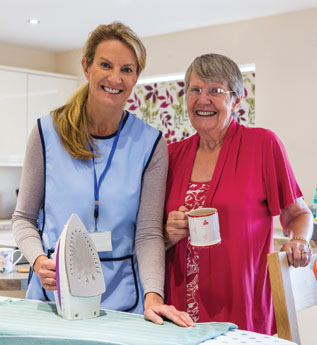 You’ll find a broad range of amenities and services such as:
You’ll find a broad range of amenities and services such as:
- Landscaping and building maintenance
- Housekeeping
- Meals (often in a variety of restaurant-style settings)
- Transportation (on-demand or scheduled)
- Recreation and fitness facilities, perhaps a pool
- Arts and crafts activities
- Cultural and educational programs
- Beauty/barber shops
- Spas
- Security provisions
It’s vital to find out exactly what is available at the senior communities you are considering, to see if the place is a good fit for you.
What’s so special about faith-based senior living?
A faith-based community is one that is associated with a particular religion. It may be directly affiliated with a religious organization or, like Magnolia Manor, it may have a religious heritage but now operates as an independent entity – often a non-profit organization. Faith-based communities offer a range of religious and spiritual activities not found in secular communities, to strengthen the sense of community for residents. However, they almost always welcome residents who practice other faiths.
At Magnolia Manor, our mission to serve seniors is based on our belief that a truly rewarding life enriches the heart and soul as well as the body and mind.
.jpg?width=500&name=Christmas%20Canta%20at%20Moore%20Chapel%20(9291).jpg)
What if you don’t describe yourself as spiritual? We all have emotional reactions and connections to the world around us. Our Magnolia Manor campuses are located in exceptionally lovely settings from the Piedmont to the low country to the coast. Each one is vibrant with activities onsite and within the nearby town, but all of them also provide quiet serenity for contemplation, yoga, or walking outdoors to take in Mother Nature’s beauty.
The key to getting the most from senior living is making your decision while you still have options. Moving to independent living allows you to downsize efficiently so you can make most effective use of your days. Moving to assisted living before you need a lot of help enables you to retain independence longer. Moving to memory care when you have early-stage dementia can help you get care that could help delay progression.
If you wait until the last minute, you’ll have far fewer options and you and your family will feel undue pressure to make a quick decision, which may not be in your best interest. Besides, the best communities often have waiting lists.
Types of Senior Living
Whatever your stage of health as a senior, or your preferred lifestyle, there’s a senior living accommodation just made for you. There are five basic types of care:
Independent Living
This is you, living your life on your own just as you would in any other home and neighborhood. You do not need assistance, so these communities are designed to help you enjoy every moment of active good health. They may be called independent senior living, retirement communities, active adults, 55+ or continuing care, but they all have a minimum age requirement – usually 62, but sometimes as low as 55. (At Magnolia Manor, it’s 62.)
These communities can differ vastly, from a single apartment building or an RV park to entire villages, from basic accommodations and services to luxurious living spaces and a long list of amenities and services available onsite. Some are themed – built resort-style around golf or tennis, or associated with a nearby university. Some are for singles only.
.jpg?width=600&name=2019%20Wilder%20Walk%20(8295).jpg)
Assisted Living
The majority of seniors will eventually need help with at least some daily tasks of activities of daily living. Assisted living is designed to promote maximum continued independence, by providing just the help you need.
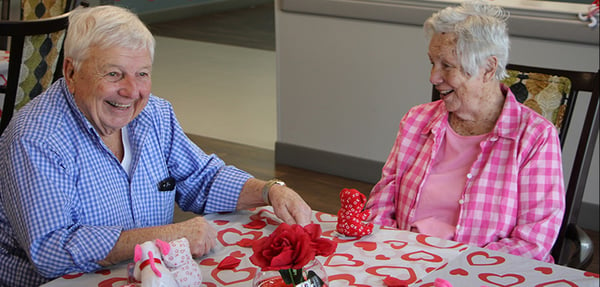
Memory Care
An increasing number of seniors are having to face some type of dementia which slowly reduces the ability to think, solve problems, recall information, or perform daily tasks. Alzheimer’s disease is the most common form of dementia, but there are others. Each is somewhat different, but memory care communities are specifically designed to protect as well as engage those with early to late-stage dementia.
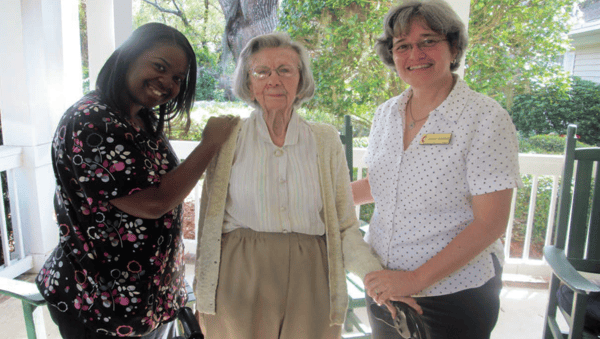
Skilled Nursing
Seniors with progressive chronic diseases or who have other complex health problems require round-the-clock care from medical professionals – more than assisted living can provide. Modern skilled nursing facilities are nothing like the nursing homes of old, but like other types of senior living accommodations are designed to engage and enrich daily life to every extent possible.
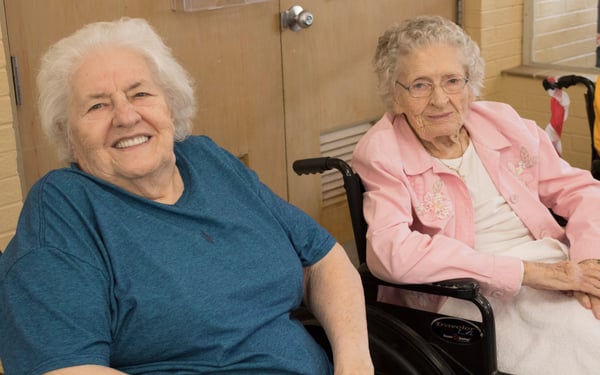
Rehabilitation
A temporary stay in a rehab facility can help seniors recover better and faster from joint replacement or heart surgery, a stroke, a fall or other similar event. The purpose of rehabilitation is to help patients return to full independence or to recover maximum strength and capabilities.
.jpg?width=600&name=Americus%20Rehab%20Therpay%20(9632).jpg)
You can move into a senior living community at any stage. Some retirement communities cater only to independent residents, whereas many senior communities offer multiple housing types and care levels to help residents age in place as their needs change. Some may offer just one or two care levels, others provide a full continuum of care.
Continuing Care Retirement Communities, or CCRCs, are formally-designated operations that accommodate residents through every stage from independent living through end-of-life. Residents pay for much of this lifelong service up front with a hefty buy-in fee. Many faith-based communities operate as CCRCs. Magnolia Manor, however, is a full-service senior living community. We offer a continuum of care on most of our campuses, without the large buy-in fees. We believe in offering quality care at an affordable cost.
To help you learn more about each of the care-level options, we have created a series of detailed resources available on our Free Guides webpage.
What Is It Like Living in a Faith-Based Senior Community?
Residents can take advantage of all the services and amenities typically available at any senior community – and then some, because faith-based communities offer an additional complement of spiritual activities and amenities not found in other types of settings.
Our Magnolia Manor family of award winning senior living communities includes campuses in nine locations sprinkled throughout southern Georgia. Each is different in size, setting and range of care services and amenities, but all feature the warmth and compassion that define life for our more than 1,100 Magnolia Manor residents.
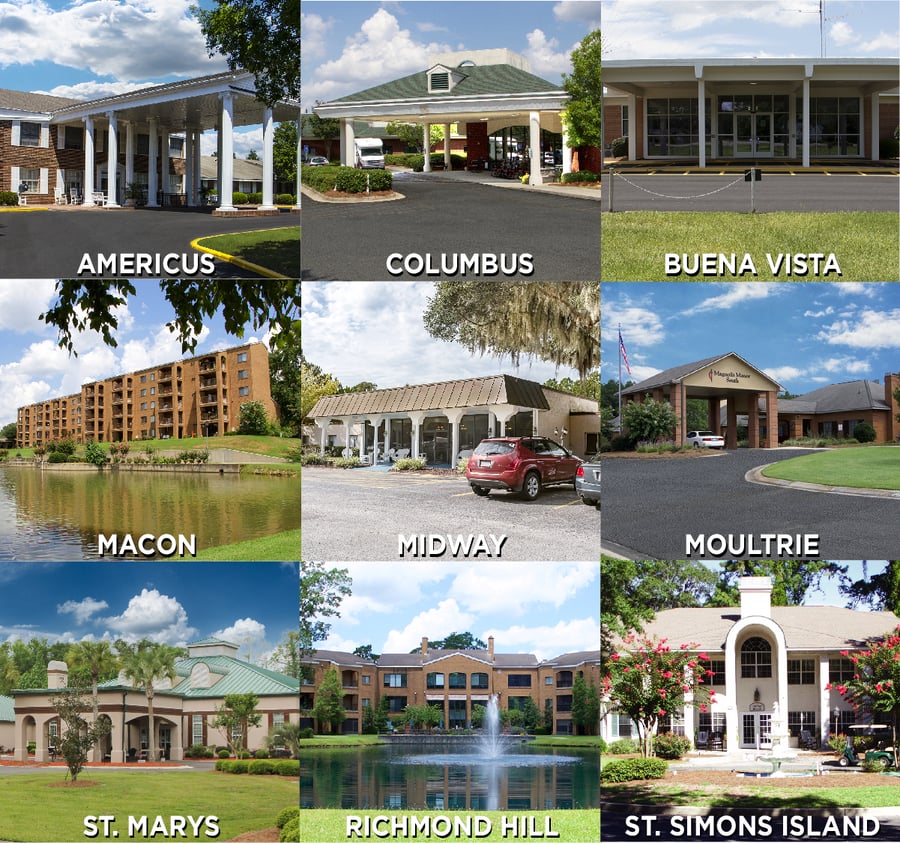
Americus
This is where it all started, more than a half-century ago. As our flagship community, Americus is our largest and most diverse. Residents can take advantage of independent living, our state-of-the-art Mattie H. Marshall Memory Care center, skilled nursing, and rehabilitation services.
Buena Vista
Known as Magnolia Manor of Marion County, this community provides skilled medical care for long-term residents as well as short-term rehabilitative care for those recovering from an injury, surgery such as joint replacement or a major health event such as a stroke or heart attack.
Columbus
Magnolia Manor offers assisted living, memory care, and skilled nursing at the Columbus campus. We are adding a second location to the Columbus area, known as The Lodge. This campus will offer full-service care from independent living to skilled nursing within a single community.
Macon
This small, intimate-feeling community is home to independent and assisted living residents. Macon also offers Supportive Housing for independent seniors who meet the low income requirements.
Midway
This latest addition to the Magnolia Manor family provides long-term skilled medical care and also rehabilitation services.
Moultrie
Another smaller community, Moultrie, is home to independent and assisted living residents.
Richmond Hill
Forty acres of beautiful low country surrounds our independent and assisted living residents on our Richmond Hill campus. Here, independent residents can also take advantage of additional “catered” services to assist with some personal tasks.
St. Marys
Both independent and assisted living apartments are available at our picturesque campus in St. Marys, ranked one of Georgia’s Top 10 Happiest Cities.
St. Simons Island
Island living is carefree indeed in this Magnolia Manor community that offers independent and assisted living as well as skilled nursing and rehabilitation. As at Richmond Hill, this community also offers “catered” extras for independent seniors.
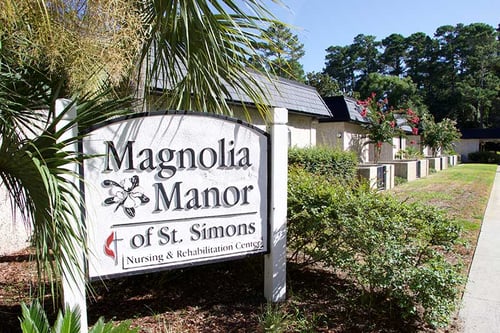
As people, we are all very different, with differing preferences when it comes to living space and how we spend our day. Because Magnolia Manor is so diverse, and thanks to our holistic approach to senior living, you can choose a community you love in every way and also get everything you need to feed your spiritual self and share that spirit with others.
Our comprehensive approach means residents can experience the best of all health-related care, not only physical care. Residents and staff, “You can tell the difference right when you step into the building. Everyone feels like family.”
“We don’t apologize for talking about our faith.”
These words from a Magnolia Manor resident in Midway could have come from almost anyone on any of our campuses.
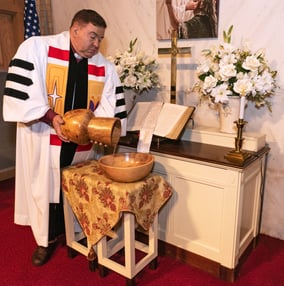 As Vice President of Spiritual Care, Rev. Dr. John A. Walker serves as chaplain at Magnolia Manor’s Americus campus and also oversees chaplains and pastoral care at our other campuses. He and his fellow chaplains try to reach out to every new resident within a few weeks of their arrival. “Our Lord doesn’t push Himself on anyone,” he says, “but we want to share what we have to offer.”
As Vice President of Spiritual Care, Rev. Dr. John A. Walker serves as chaplain at Magnolia Manor’s Americus campus and also oversees chaplains and pastoral care at our other campuses. He and his fellow chaplains try to reach out to every new resident within a few weeks of their arrival. “Our Lord doesn’t push Himself on anyone,” he says, “but we want to share what we have to offer.”
Mostly, he tries to listen, to learn about any issues or concerns the new resident may have so he can respond if needed. He counsels the other chaplains to also “be quiet and listen more,” noting that “Jesus walked alongside folks, meeting their needs and building relationships. Then he preached.”
Every Magnolia Manor campus offers:
- A chapel or designated area for worship
- Weekly worship services (not necessarily in the morning or even on Sunday, and more frequently on some campuses)
- Weekly Bible study
- Prayer groups
- Hymnals available throughout the campus, right at hand for spontaneous singing
- Choirs on some campuses
- Occasional field trips to local churches so residents can share special spiritual occasions with a larger congregation
- One-on-one pastoral care for residents and their families.
The primary focus is one-on-one visitation with residents. Regardless of faith, Rev. Walker explains, seniors can easily feel isolated, especially during the last year with COVID-19 restrictions. Pastoral care – the art of listening – can benefit everybody because sometimes you need a different type of friend to listen. “It’s amazing what folks will share,” he says, “and that is the crux of our ministry. It’s a safe place for residents and staff to feel comfortable sharing from their heart.”
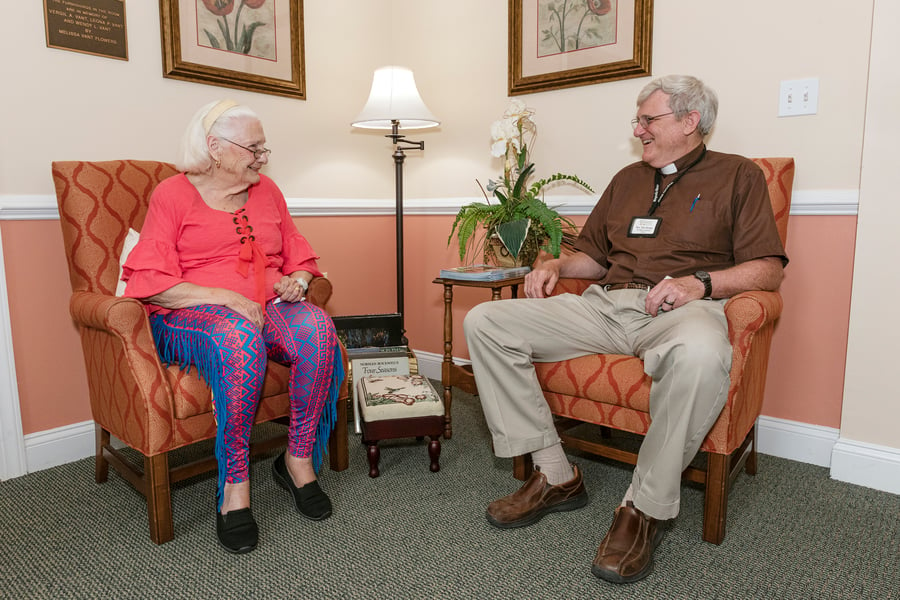
Faith-based communities appeal to staff as well as residents
What is it like to work in a faith-based senior community? According to Merck, caregivers who have a strong religious faith are often better able to cope with the stresses and challenges of caring for patients who have dementia or a terminal disease.
“You can feel the care people have for one another,” says one of our administrators. She’s talking about both staff and residents. “It feels very family-oriented because faith-based people care and it shows.”
Here at Magnolia Manor, the fact that we are faith-based attracts job-hunters who want to work in an uplifting environment. It’s also a happy surprise for applicants who get even more excited when they learn of our holistic approach. Staff members can gather for daily devotions before they start work or at the end of their day or participate in prayer groups.
For Rev. Walker, combining his calling as a pastor with serving seniors is the ultimate blessing. “I get to do what I love doing,” he says, “spending time with the residents, listening. The joy of my life is to hear the stories of folks who have walked with the Lord for 75 or 80 years.”
They have been through so much, he notes, and they’re serious about their faith. He often does a life review with them, looking back on all the ways God has blessed them. “Being able to watch them express their faith and share it blesses my soul. It keeps me going.”
What Happens When I Need More Care?
If you choose a faith-based senior community that does not offer a full spectrum of care, you may have to move somewhere else if your needs change. If you choose a Continuing Care Retirement Community or another community that does provide a full continuum of care options, you will not have to start a new search for housing that offers a different type of care. You will likely have to move to a different apartment, but you will stay within the community.
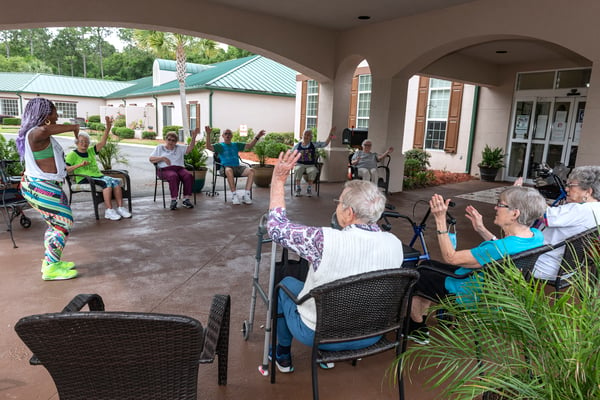
Magnolia Manor is not a CCRC, but several of our campuses do offer a full continuum of care. The type of more advanced care you require will determine whether you can remain on the same campus or you will need to move to another of our communities. Current residents always receive priority admission when change is needed. And you will still be part of our Magnolia Manor family.
We ensure that every resident who wants to stay connected to worship services, pastoral counseling, etc. is well-served, even if you have to move to a different type of housing or another campus to accommodate your care needs.
This could be your story
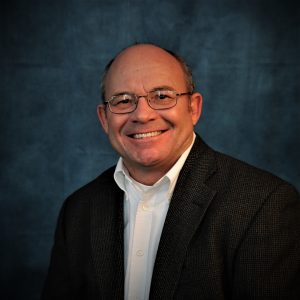 Chip Grantham is pastor of a Methodist church in Tifton, Georgia, about 20 minutes from Magnolia Manor’s Moultrie campus. He says he grew up seeing the pictures and hearing the stories of how Magnolia Manor was providing loving care for senior adults. Sadly, Chip’s grandfather had dementia. His mother witnessed the progression of her father’s disease, and when she was diagnosed with early-stage dementia, she knew she had to do something to secure her future care.
Chip Grantham is pastor of a Methodist church in Tifton, Georgia, about 20 minutes from Magnolia Manor’s Moultrie campus. He says he grew up seeing the pictures and hearing the stories of how Magnolia Manor was providing loving care for senior adults. Sadly, Chip’s grandfather had dementia. His mother witnessed the progression of her father’s disease, and when she was diagnosed with early-stage dementia, she knew she had to do something to secure her future care.
She moved into independent living at Magnolia Manor in Macon because she knew that, as her own disease progressed, she could always remain within Magnolia Manor’s family and that she would receive the care she needed, even if she ran out of funds. This was particularly important because, like her father, she was in excellent physical health and expected to live to an old age.
As Chip’s Mom started to require help, she moved to assisted living. She chose Magnolia Manor’s Columbus campus to be near Chip, who was pastoring at a church there. Later, she moved into the Mattie H. Marshall Memory Care Center at Magnolia Manor in Americus. Chip describes this state-of-the-art facility as “phenomenal.” And he feels so blessed.
“Mom is being cared for when I can’t,” he says, “at the level she needs. It feels gracious knowing I am doing what Mama wanted and decided to do when she could still decide for herself.”
And what about spiritual services?
Your faith doesn’t leave you just because your mental or physical abilities change. In fact, it can help sustain you and your family through these challenging transitions. Elder Care Alliance says that “spirituality can improve quality of life for seniors with dementia. Practicing a religion can help slow cognitive decline and reduce or stabilize cognitive disorders.” Even if residents cannot participate in Bible study, they can sing along with the devotions because they can recall the lyrics.
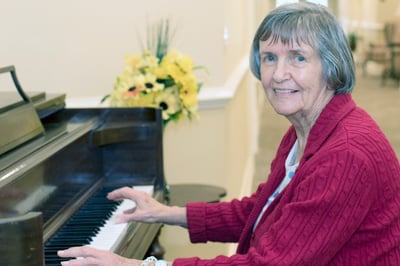 One resident at the Mattie H. Marshall Memory Care Center in Americus who has early-stage Alzheimer’s plays the piano and sings, too. She lived in Americus for years before coming to Magnolia Manor, and her husband helped start the chaplaincy program there.
One resident at the Mattie H. Marshall Memory Care Center in Americus who has early-stage Alzheimer’s plays the piano and sings, too. She lived in Americus for years before coming to Magnolia Manor, and her husband helped start the chaplaincy program there.
Rev. Walker does conduct a short worship service in the Mattie Marshall Center because some residents are still cognitively able to appreciate the service. However, when staff announce “it’s time for church,” many residents come for the music. The service includes a short devotion and short talk or sermon but the main event is 30 minutes of singing old hymns.
.jpeg?width=400&name=Ash%20Wednesday%20Service%202019%20(17).jpeg) “They all remember the old Cokesbury hymnal,” he says. “They can sing the hymns from memory, and that is very meaningful. It helps them express emotion, and that’s the beauty of this ministry.”
“They all remember the old Cokesbury hymnal,” he says. “They can sing the hymns from memory, and that is very meaningful. It helps them express emotion, and that’s the beauty of this ministry.”
Rev. Walker has also been instrumental in creating a series of ministry-based brochures that aim to help families cope with a loved one’s dementia, with topics such as dealing with grief and when to call for a chaplain.
Skilled nursing residents receive pastoral care, too. While one-on-one contacts are important for everyone, many skilled nursing residents don’t have the mobility to attend services or other group activities, so Rev. Walker and the other chaplains go room to room, visiting individually with each person. Because the Americus campus is the largest, there is a full-time associate chaplain assigned solely to the nursing center. He often takes his guitar along so residents can sing hymns with him when he visits.
Comparing the Costs of Senior Living Communities
Costs of senior living can vary dramatically depending on the type of community you choose, where it’s located, and the scope of amenities and services included. This is something you will need to research and compare carefully in order to decide what fits most comfortably for you.
As noted earlier, Continuing Care Retirement Communities charge a very large fee up front – typically hundreds of thousands of dollars – which helps cover the cost of your living expenses and whatever care you may need for the rest of your life. They also charge monthly for optional daily living expenses, so you will have some ongoing cost. However, most senior living communities charge monthly.
As you compare costs, keep in mind that the monthly fee at a senior living community includes not only your rent but other expenses such as utilities and maintenance. It might include some or all of your meals, personal care or assistance you regularly receive, housekeeping, laundry, transportation, use of fitness or other facilities, etc. Ask detailed questions about what is or is not included, so you can accurately compare the cost to your total monthly expenses now.
vIf you’re considering any type of senior living accommodation at one of our Magnolia Manor campuses, you can easily see and compare costs using this handy Cost of Living Calculator.
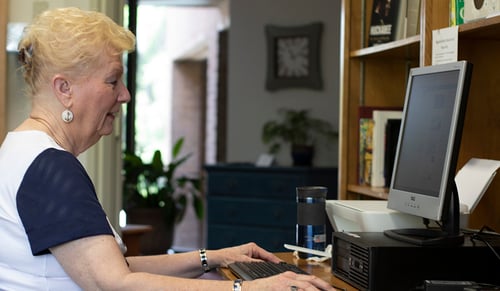
Our faith tells us to lend a helping hand
Faith-based communities tend to be especially cognizant of financial constraints that might create barriers for prospective residents, so they often look for ways to make their community more affordable or to provide financial assistance for residents with fewer personal resources.
Most are non-profit organizations, so they can operate more efficiently and raise funds more easily. That said, many faith-based communities are formally-designated CCRCs, where you will still have to pay a large up-front fee.
Here at Magnolia Manor, inclusiveness is fundamentally important to us. Our strong faith drives us to do everything we can to make exceptional senior living affordable so that our faith-based community can be available to those from all financial walks of life. We do that by:
- Working with state and federal agencies to obtain funding for Supportive Housing. This enables us to discount monthly fees for low-income independent seniors.
- Holding annual and one-time fundraising campaigns and encouraging other contributions from friends and families of residents, those who share our faith and the general public. These funds help offset costs of providing the best for our residents – outstanding amenities and daily services as well as the loving, personalized care for which Magnolia Manor is renowned.
- Inviting churches from around the state, especially those within our United Methodist Church Conference, to partner with us in fundraising activities. We also work directly with churches and their members to encourage volunteering at a nearby Magnolia Manor campus or in other ways.
How Will You Pay For Senior Living?
If you are an independent senior, you are responsible for all your costs of living no matter where you live. We noted above that your monthly payment in a senior community may be more cost-efficient because it covers many necessities with a single payment, but whatever the amount, you’ll have to rely on your own resources, typically:
- Pension or Social Security payments
- Annuity withdrawals
- Savings, IRAs, 401(k) or other retirement accounts
At Magnolia Manor in Americus and Macon, we offer Supportive Housing, which helps reduce monthly costs for low-income independent seniors. This is something you should ask about if you think you might qualify.
If you will require in-home help with personal care or activities of daily living, but not enough to make you a candidate for assisted living, your health insurance or long-term care insurance or Medicare or Medicaid may cover some or all of those costs.
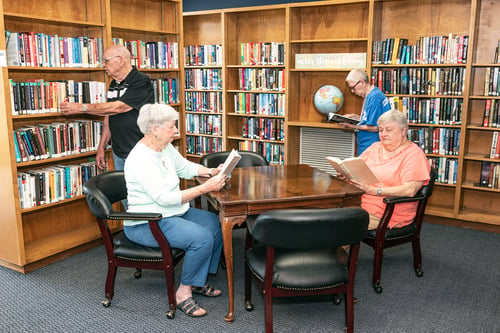
Generally, the more medical care you need, the more likely the costs will be covered by some form of insurance – private health insurance, Medicare, Medicaid, or long-term care coverage. Understanding which costs might be covered, when, and to what extent can be highly complicated. It is best to discuss your specific circumstances with your primary care provider and your prospective senior living community, so you can clearly predict costs and what portion must be paid by you.
To learn more, you can read our free guide, “How to Make a Plan for Affordable Senior Living.”
How to Choose a Faith-Based Senior Community
Any move requires careful consideration. You want to find appealing accommodations, in an appealing neighborhood, with an appealing range of services and amenities conveniently located nearby. The decision can be a challenge because “appeal” is very personal. You will have to do your research and ask lots of questions. If you do this, you can find a community that suits you beautifully and where you will fit in comfortably.
Make a list of all things that are essential to make you happy in your new community. Then make a list of things that would be wonderful but aren’t deal-breakers, and a list of things that just won’t work for you. (If you love peace and quiet, an urban setting will not be relaxing.)
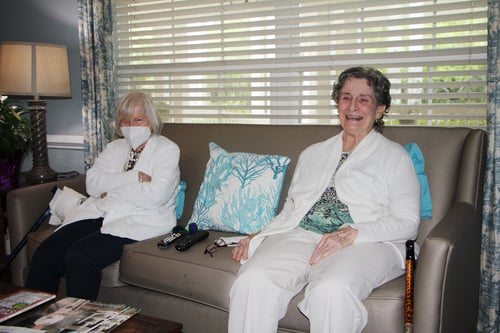
Then make a list of questions you want to ask. Write them down, because you won’t remember all of them and you don’t want to overlook some important detail. This is your future! In particular, ask about:
- Minimum age requirements and overall age range of residents
- Activities residents most often engage in
- How the community interacts with the surrounding town or city
- Meals – are they provided? Where and when?
- Transportation – is there a shuttle or other free service for residents?
- What will your monthly fee cover, and what will you have to pay for yourself?
- Security and emergency provisions and procedures
Get specific with faith-based questions
All the secular considerations come into play, of course, when you’re considering senior living. But if the idea of a faith-based environment has special appeal, then as you think about all the other factors that go into choosing a community, make a list of faith-related wants and needs as well. And be sure to make those details a top priority as you research and evaluate prospective communities.
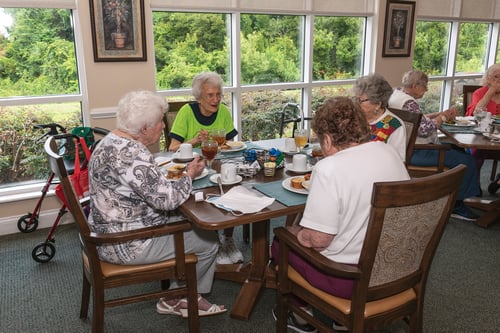
Don’t hesitate to ask faith-based questions! You can be pretty sure they will welcome you with open arms, but you still want the right fit. Here are some of the questions we are often asked about Magnolia Manor:
- Do I have to be a Methodist?No. We welcome all faiths as well as individuals who don’t identify with any faith. Just like any other family, we have many things in common but we are not all the same.
- How often are services held?This differs from one campus to another. Every campus has a designated chaplain. Some have a stand-alone chapel, others have a designated space used for worship services – these spaces accommodate all faiths for services. All of our communities offer at least one weekly worship service, and several offer multiple services throughout the week. All offer additional opportunities such as Bible study, prayer groups and pastoral counseling for both residents and families.
- Can I help create religious programming?Yes, we encourage that! If you want to start a prayer group, for example, your campus chaplain will be happy to help with that.
See for yourself
Will you love your new community? However great it may seem on paper or online, you need to visit personally so you can use all your senses to evaluate it as a future home. Does it look, sound, smell and taste homey and comfortable? Can you feel an abundance of love and caring from the residents and staff? Picture yourself doing everyday things as you take your tour.
- Check out the common areas, both indoors and outside – is there a chapel onsite?
- Check out an apartment or villa
- Eat a meal
- Sit in on an activity or attend an event
- Meet the pastor, and join a worship service or prayer group
Take notes as you tour, and if there is time, plan a second visit before making your final decision.
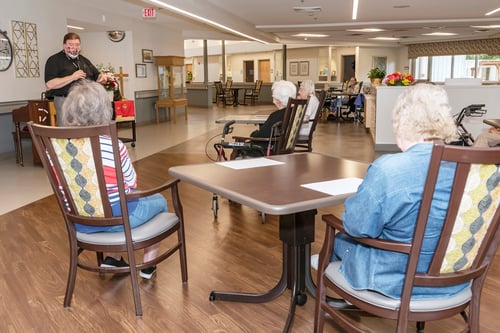
How to find senior living communities
There are online resources for researching senior communities across the country. If you want to stay local, ask for referrals from:
- Your primary care provider
- Family members
- Your friends or neighbors
- Your pastor or fellow church members
- Your community’s Senior Center
You can search the list here to find organizations around the country that offer religious-based senior living based on a wide variety of faiths, from Baptist to Buddhist.
For Georgia residents, Magnolia Manor has long been the clear choice for faith-based senior living. Many have already had contact with one of our campuses, through their church or another family member. For example, one of the residents grew up in Richmond Hill, where her parents were active in the Methodist church, so she was familiar with Magnolia Manor from the day that campus was built. Life took her away from Richmond Hill, but after her husband and son both passed away, she came back. She has lived at Magnolia Manor in both independent and assisted living for about seven years now.
Faith Carries You Forward
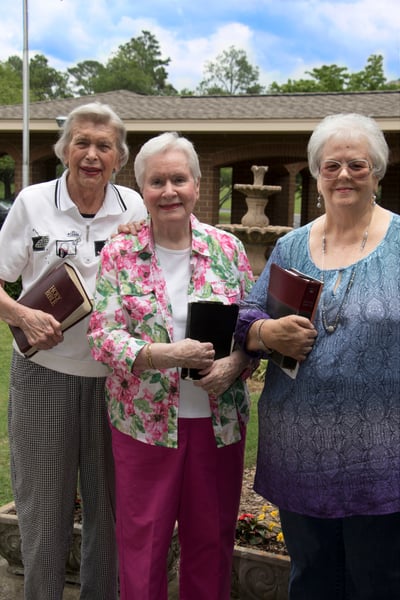 Moving to any senior living setting is an act of faith – you trust that you will be getting whatever care you need, or that you will be able to enjoy your current independence to the fullest. You trust that you will be happy and feel fulfilled in your new home and setting, and that you will have great neighbors. You trust that there will be competent, compassionate staff to assist as needed.
Moving to any senior living setting is an act of faith – you trust that you will be getting whatever care you need, or that you will be able to enjoy your current independence to the fullest. You trust that you will be happy and feel fulfilled in your new home and setting, and that you will have great neighbors. You trust that there will be competent, compassionate staff to assist as needed.
Moving to a faith-based community can instill greater confidence and peace of mind right from the start. Not everything will be new to you. One of the most important aspects of your life – your faith -- will still be present and familiar, smoothing the transition and helping you make new friends even faster in your new home. You may find instant connections with staff as well, since many will likely share your faith.
One excellent way to learn what it’s like to live (and work) at Magnolia Manor is by reading our quarterly magazine, Manor Living. You’ll meet some of our residents and staff, find out what’s new at our campuses around Georgia, and feel the warm and loving atmosphere even as you turn the pages. You can see current and back issues online, and you can subscribe so you’ll never miss a new copy.
In the words of one resident, “It’s a real blessing to live here with others. We’re all elderly, some are in better physical condition than others, but we all have a good time. We’re a close-knit group. We enjoy each other, just trying to be ourselves and be kind to others.”
Conclusion
At Magnolia Manor, we have been serving seniors for more than 50 years. We were excited about this calling from the very beginning because we knew it was the right thing to do. And we have felt blessed over the years that we can provide a full spectrum of consistently outstanding, compassionate care in diverse, beautiful surroundings. We know that our unique blend of family atmosphere and emphasis on mind, body and spirit makes a difference every day – for our residents, their families, and our staff.
We also know it can be hard to make the decision to move to a senior living community. But above all, we have faith – faith that you will make the best decision for yourself or your loved one. We’re here to help, whether you have general questions about senior care or specific questions about one of our Georgia communities.
